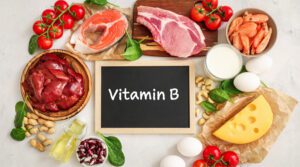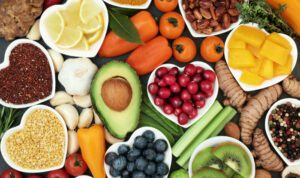10 Best Nutrients to Support Emotional Well-Being
Introduction
Our emotional well-being is an integral part of our overall health, influencing how we experience and navigate life’s challenges. While mental health involves complex factors, there’s a growing body of evidence suggesting that certain nutrients can play a significant role in supporting our emotional balance and resilience. In this article, we’ll explore the 10 best nutrients that contribute to maintaining emotional well-being.
1. Omega-3 Fatty Acids: Mood Stabilizers
Omega-3 fatty acids, particularly EPA and DHA, have been linked to improved mood and reduced symptoms of depression and anxiety. These healthy fats are essential for brain health and may help regulate neurotransmitters that impact mood. Fatty fish like salmon, flaxseeds, and walnuts are excellent sources of omega-3s.
2. B Vitamins: Stress Relievers
B vitamins, including B6, B9 (folate), and B12, play a crucial role in producing neurotransmitters like serotonin and dopamine, which are essential for mood regulation. These vitamins also contribute to stress management and cognitive function. Incorporate whole grains, leafy greens, and lean meats to ensure an adequate intake of B vitamins.

3. Vitamin D: The Sunshine Nutrient for Happiness
Vitamin D, often dubbed the “sunshine vitamin,” has been linked to improved mood and a lower risk of depression. It may influence the expression of genes related to mood regulation and impact serotonin production. Exposure to sunlight and vitamin D-rich foods like fortified dairy products and fatty fish can contribute to emotional well-being.

4. Magnesium: Calming Mineral
Magnesium is known for its calming effects on the nervous system. It plays a role in reducing stress and anxiety by regulating neurotransmitters and cortisol levels. Leafy greens, nuts, seeds, and whole grains are excellent sources of magnesium.

5. Zinc: Mood Stabilizer and Antioxidant
Zinc is involved in neurotransmitter function and helps protect the brain from oxidative stress. Adequate zinc levels have been associated with improved mood and reduced anxiety. Include zinc-rich foods like lean meats, legumes, nuts, and seeds in your diet.
6. Probiotics: Gut-Brain Connection
A healthy gut microbiome is increasingly recognized as essential for mental well-being. Probiotics, the beneficial bacteria that reside in your gut, influence neurotransmitter production and communication between the gut and brain. Yogurt, kefir, sauerkraut, and other fermented foods can introduce beneficial probiotics into your system.
7. Iron: Energy and Mood Booster
Iron deficiency is linked to fatigue, irritability, and low mood. This essential mineral is involved in oxygen transport and energy production, both of which can impact emotional well-being. Incorporate iron-rich foods like lean meats, poultry, beans, and fortified cereals.

8. Selenium: Mood Elevator
Selenium is an antioxidant that helps protect the brain from oxidative damage. It’s also involved in thyroid function, which can influence mood and energy levels. Brazil nuts, seafood, and whole grains are good sources of selenium.

9. Vitamin C: Stress Buster
Vitamin C is not only essential for immune health but also for managing stress. It helps regulate cortisol levels and protects the brain from oxidative stress. Citrus fruits, strawberries, bell peppers, and broccoli are rich sources of vitamin C.
10. Antioxidants: Protecting Emotional Resilience
Antioxidants, including vitamins C and E, selenium, and zinc, help protect the brain from oxidative stress and inflammation, both of which can impact mood and emotional well-being. A diet rich in colorful fruits and vegetables, nuts, seeds, and whole grains provides a variety of antioxidants.

FAQs
Q1: What are the 10 best nutrients for maintaining emotional well-being?
A: The 10 best nutrients for maintaining emotional well-being include:
- Omega-3 fatty acids: Omega-3 fatty acids are essential for brain health and can help to improve mood. They are found in fatty fish such as salmon, tuna, and mackerel.
- Magnesium: Magnesium is a mineral that helps to regulate mood and reduce stress. It is found in leafy green vegetables, nuts, and seeds.
- Vitamin B6: Vitamin B6 is a vitamin that helps to produce serotonin, a neurotransmitter that regulates mood. It is found in bananas, chickpeas, and potatoes.
- Folate: Folate is a vitamin that helps to produce serotonin and dopamine, neurotransmitters that regulate mood. It is found in leafy green vegetables, beans, and citrus fruits.
- Iron: Iron is a mineral that helps to transport oxygen to the brain, which can help to improve mood. It is found in red meat, poultry, and beans.
- Zinc: Zinc is a mineral that helps to regulate mood and reduce stress. It is found in oysters, red meat, and legumes.
- Vitamin C: Vitamin C is an antioxidant that helps to protect the brain from damage. It is also thought to help to improve mood. It is found in citrus fruits, broccoli, and strawberries.
- Selenium: Selenium is a mineral that helps to protect the brain from damage. It is also thought to help to improve mood. It is found in Brazil nuts, tuna, and eggs.
- Probiotics: Probiotics are live bacteria that are good for the gut. They are thought to help to improve mood by reducing inflammation and promoting the production of serotonin. They are found in fermented foods such as yogurt, kefir, and sauerkraut.
- Curcumin: Curcumin is a compound found in turmeric. It has powerful anti-inflammatory and antioxidant properties. It is thought to help to improve mood by reducing inflammation and promoting the production of brain-derived neurotrophic factor (BDNF), a protein that promotes the growth and repair of brain cells.
Q2: How can I get enough of these nutrients?
A: The best way to get enough of these nutrients is to eat a healthy diet that includes a variety of foods from all food groups. You can also take a daily multivitamin supplement to ensure that you are getting all the nutrients you need.
Q3: What are the benefits of getting enough of these nutrients?
A: There are many benefits to getting enough of these nutrients, including:
- Improved mood
- Reduced stress
- Increased energy levels
- Better sleep
- Improved cognitive function
- Reduced risk of chronic diseases
Q4: What are the risks of not getting enough of these nutrients?
A: The risks of not getting enough of these nutrients include:
- Depression
- Anxiety
- Fatigue
- Poor sleep
- Cognitive decline
- Increased risk of chronic diseases
Q5: Where can I find more information about these nutrients?
A: There are many resources available to learn more about these nutrients. Here are a few suggestions:
-
- The website of the U.S. Department of Agriculture (USDA) has a section on nutrients.
- The website of the National Institutes of Health (NIH) has a section on dietary supplements, which includes information about nutrients.
- The website of the Harvard School of Public Health has a section on healthy eating, which includes information about nutrients.
- The website of the U.S. Department of Agriculture (USDA) has a section on nutrients.
Conclusion
While nutrients alone can’t solve all emotional challenges, they play a significant role in supporting emotional well-being. Incorporating a variety of nutrient-rich foods into your diet can contribute to a balanced mood, reduced stress, and enhanced resilience. Remember that a holistic approach, including a nutritious diet, regular physical activity, quality sleep, and seeking professional support when needed, can collectively contribute to maintaining optimal emotional health.





